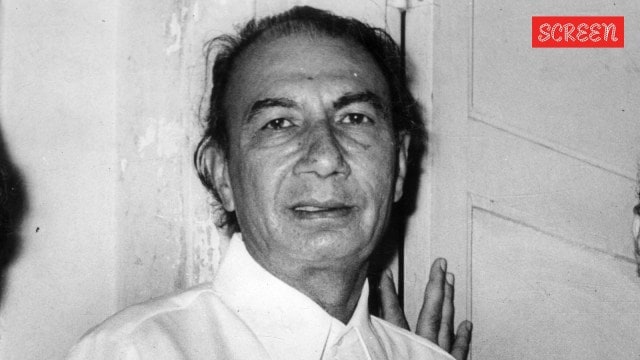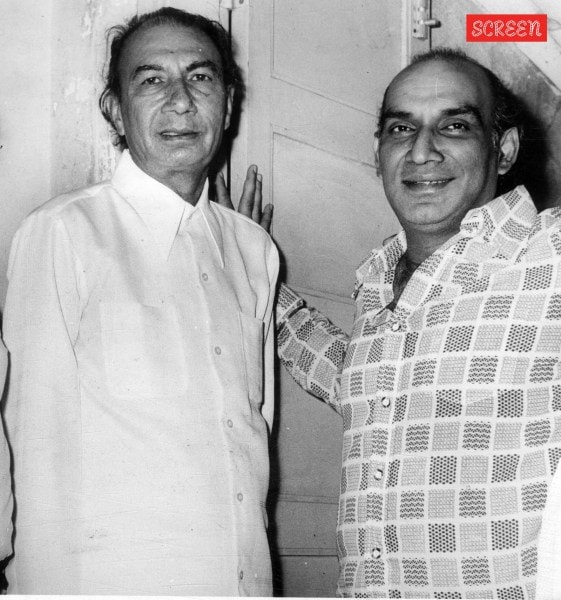Click here to follow Screen Digital on YouTube and stay updated with the latest from the world of cinema.
Sahir Ludhianvi, the original rebel who shook Bollywood: Demanded one rupee more than composer, but never cared about money
On Sahir Ludhianvi's birth anniversary, recalling the time when he demanded more pay than the music composer just so his profession could get the respect it deserved.
 Sahir Ludhianvi was the rebel before Bollywood understood rebellion. (Photo: Express Archives)
Sahir Ludhianvi was the rebel before Bollywood understood rebellion. (Photo: Express Archives)Days before the release of Prakash Mehra’s Zanjeer, Salim Khan and Javed Akhtar, the screenwriter duo popularly known as Salim-Javed, decided on an act of rebellion. They got their name painted on to the posters of Zanjeer all over the city of Mumbai, leaving Bollywood shocked. No one expected screenwriters to have a say, let alone scream from the rooftops that the films everyone was enjoying, were written by them. When the same screenwriters went even further and demanded that they must be paid Rs 1 lakh more than the biggest superstar of the time, Amitabh Bachchan, it was unprecedented, but they succeeded. Salim-Javed were true rebels but decades before they shook Bollywood, it was lyric writer Sahir Ludhianvi who set a precedent for how lyric writers should be respected in an industry that heavily depended on music.
Sahir wrote songs for over 100 films during his time in the film industry and some of his best known gems include “Abhi Na Jao Chhod Ke” (Hum Dono), “Jo Vaada Kia Voh Nibhana Padega” (Taj Mahal), “Yeh Duniya Agar Mil Bhi Jaaye Toh Kya Hai” (Pyaasa), among many others. Sahir wasn’t just a lyric writer, he was a poet and had a certain air of arrogance about his art. So when someone dared to look down at his art, he took offence, and he never forgave them. It was for this reason that when he fell out with a music composer, he stopped working with them altogether. After working with SD Burman in films like Pyaasa (“Jaane Voh Kaise Log The, “Sar Jo Tera Chakraye”, others) and Baazi (“Tadbeer Se Bigdi Hui Taqdeer Bana Le”, others), OP Nayyar in Naya Daur (“Ude Jab Jab Zulfe Teri”, others), he stopped collaborating with them. In the book Sahir Ludhianvi: The People’s Poet by Akshay Manwani, filmmaker Yash Chopra, who was a Sahir loyalist and collaborated with him in films like Waqt, Kabhi Kabhie, Daag, Trishul, and others, said that Sahir didn’t care much for money. All he cared for, was dignity and respect. “He never bothered about money. It was always about his dignity, his terms and his position vis a vis the music director’s,” Chopra said.
 Sahir Ludhianvi (left) with director Yash Chopra (right). (Photo: Express Archives)
Sahir Ludhianvi (left) with director Yash Chopra (right). (Photo: Express Archives)
This one upmanship with the music director came about because back in the 1950s, music composers were seen as creators of songs, and the lyric writers, who were just as responsible for the essence of the songs, were not given as much respect. A filmmaker approached a music director and that music director hired lyricists and singers to make the song. Thus, many music directors started projecting themselves as the bosses of lyric writers, which, in Sahir’s eyes wasn’t the case. In the same book, late lyricist Naqsh Lyallpuri recalled that this was primarily the reason why, even after the success of Naya Daur, OP Nayyar and Sahir fell out. “OP Nayyar had a habit of claiming the entire credit for the success of a film’s soundtrack. He would try and relegate the lyricist to a secondary role. Sahir did not like this,” he said.
Much like today, even back in the 1950s, success in the film industry was defined by one’s pay and since OP Nayyar was making the big bucks and not paying his lyric writers sufficiently, it appeared that their contribution wasn’t good enough to be paid handsomely, and so, Sahir did what Salim-Javed did two decades later. He announced that he would be paid one rupee more than the composer. Such was his belief in this position that he decided to not work with Naushad (Baiju Bawra, Mughal-e-Azam) because he had heard that Naushad did not pay his lyric writers respectfully. “He had heard of Naushad seeking a huge sum from the producers for his own work but, on the other hand, paying a pittance to the songwriter,” Naqsh shared. Sahir’s act of asking for one rupee more had nothing to do with money, it was just about getting the respect he deserved.
Sahir made sure that not just people from the industry, but all those who were listening to the songs written by him, also gave him his due. Not just him, but all the lyric writers who were unseen and unheard until then. Such was the state that when a song played on All India Radio, and the credits were read out loud, the lyricist’s name was conveniently missed. In director and screenwriter Khwaja Ahmad Abbas’ book ‘Sone Chandi Ke Buth: Writings on Cinema’, the filmmaker shared that Sahir was “obsessed” with the idea of elevating the status of poets in the Hindi cinema. “No matter how big a film poet was, his name never appeared in the publicity and marketing material. His name was never announced when his songs were played on the radio,” he shared, and Sahir made it his mission to change this practice. This was a problem because the music composers and singers got all the glory that was rightfully theirs but the lyric writers were ignored. KA Ababs shared that he and Sahir went to meet the director general (DG) of All India Radio and recalled the conversation that changed the status of lyric writers in our country.
“We asked, ‘You announce the singer’s name with every song you play, why do you ignore the poet?’ The DG replied, ‘We don’t have enough time’. Sahir retorted, ‘What about the time spent announcing the names of those who send requests?’ The DG was finally convinced, and an order was issued that the name of the poet would be announced with every song,” he recalled. Yash Chopra also endorsed this story in Manwani’s biography and called it “one of his biggest contributions” to the Indian music industry.
Sahir did his part and decades later, Javed Akhtar carried the torch forward as he became a key driver in a significant change in the Indian music industry in 2012. Of course, the world still isn’t fair for a lyric writer in the Hindi film industry but Sahir did set an example for those who came after him. And it was perhaps his devil-may-care attitude that pushed Salim-Javed to go all in when they demanded what they deserved. Sahir’s poetry lives on but his inquilabi attitude has left Bollywood.
- 01
- 02
- 03
- 04
- 05



































